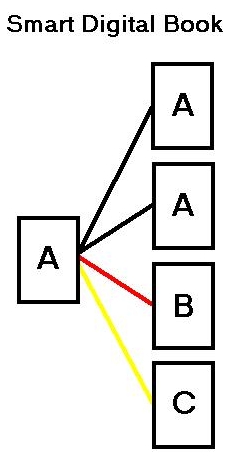ePub eBooks are a dead-end for all publishers.

ePub:
1) Standalone
2) Flat
3) Static
4) Unconnected
5) A pirate’s paradise
Smart Digital Books are what print publishing need to continue existing:

Smart Digital Books:
1) Nodal
2) Multi-dimensional
3) Dynamic
4) Connected
5) A pirate’s worst nightmare
In the above graphic of a smart digital book, I’m briefly illustrating the value of metadata connectedness to readers and especially to publishers. Axiom 3:
3 – Connections between books add value to all books
So a smart digital book from publisher A leads to two other books from the same publisher (A), as well as a book from two other publishers (B and C). (Note de Bono’s rule here, however: “Patterns are asymmetric. The route from A to B is not the same as the route from B to A.” So it might not be likely that the books on the right would lead back to the book on the left. This, however, is irrelevant in the overall network.)
The work of Dave Winer, father of RSS, is most likely important in all of this. Start paying attention to him, especially his rssCloud formulations.
@doctorlaura will probably again wonder about metadata versus marginalia in this example, but I’m blunting her objection here. I am not parsing out the underlying metadata that would make this connection. I’m saying this is the type of connection metadata will make possible.
The following statement made by a noted criminologist illustrates the point: “When men first come into contact with crime, they abhor it. If they remain in contact with crime for a time, they become accustomed to it, and endure it. If they remain in contact with it long enough, they finally embrace it, and become influenced by it.”
— Think and Grow Rich by Napoleon Hill, published 1937
And:
But you don’t think about these trade-offs anymore. You’ve already made this decision many times in the past, so you now assume that this is the way you want to spend your money. You’ve herded yourself — lining up behind your initial experience at Starbucks — and now you’re part of the crowd.
— Predictably Irrational by Dan Ariely, published 2008
I grant 99.9% of people will find this connection to be too obscure. That’s because the Predictably Irrational story is too long for a Fair Use quote, so I’ve cut to the end of the tale. Also, people looking at this are seeing it from the outside, unlike someone — um, me — who has recently read both books and can see how they fit together. (While reading PI, I immediately thought of that passage from T&GR.)
The point is metadata will allow conceptual linking. Anyone interested in concept “A” will be able to extract that concept from within other books.
This is a knowledge cascade effect that adds value to the original book and opens the way for sales of other books for everyone.
To bring up Outliers once again. It has a chapter about the 10,000 hours required to achieve distinctive mastery. There is an entire book about that subject alone. How many people reading Outliers as a print book or as an eBook know that or would bother to find out? Such a connection would be possible with smart digital books, eliminating the friction current print and eBooks create for such discovery.
It’s this connecting of smart digital books that will save publishing. It will lead to on-the-spot discovery for readers, it will require human expertise, the metadata and connections become a new capital asset, and all books increase in value to readers because new connections are being added all the time.
That race to the bottom pricing with flat, static ePub eBooks comes to a halt with smart digital books.
Moving on …
A good overview of HTML5.
XML is being used for voice applications: VoiceXML at 10: Fueling Growth in Voice Apps and Hosting.
Previously here:
Smart Digital Books Metadata Notes #5
Metadata Is Money
Smart Digital Books Metadata Notes #4
Smart Digital Books Metadata Notes #3
Smart Digital Books Metadata Notes #2
Smart Digital Books Metadata Notes #1
Dumb eBooks Must Die, Smart eBooks Must Live



 Posted by mikecane
Posted by mikecane 


